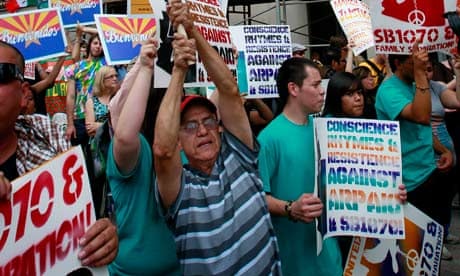Hispanic communities across Arizona are preparing to carry out acts of non-violent resistance designed to protect themselves against what they fear is an imminent surge in police harassment against them, the Guardian has learned.
Groups working with Latino immigrant communities in Phoenix and other cities across the state are actively discussing protest measures – from mass demonstrations to a refusal to carry papers even if they are full US citizens – in preparation for what they fear will be the introduction of blatant racial profiling by the authorities.
The deliberations come as Arizonans anxiously await the decision of the US supreme court, possibly as early as Monday, over the state's controversial immigration law SB1070 that imposes a swingeing attack on undocumented immigrants, most of whom are of Mexican origin.
State authorities are equally actively preparing on their side to implement some of the most hotly contested and feared aspects of the law, which was introduced in 2010 with the express aim of making life in Arizona so uncomfortable for undocumented immigrants that they would quit the state.
In particular, all eyes are on section 2b – dubbed the "show your papers" clause – that requires police officers to investigate the immigration status of any person they come in contact with should they have a "reasonable suspicion" that the individual is undocumented.
Jan Brewer, Arizona's governor, has ordered police chiefs to redistribute a training video that was prepared in 2010 when SB1070 was enacted. It purports to educate police officers in how to enforce the "reasonable suspicion" clause without straying into racial profiling which would be in breach of the US constitution.
Brewer's executive order is a clear indication that she believes that section 2b will be allowed to stand by the supreme court. It has been on hold for the past two years awaiting the court's judgement.
When the supreme court considered SB1070 in April, the sceptical questions by many of the nine justices suggested that they were minded to uphold the "reasonable suspicion" clause.
"The governor is optimistic that the heart of SB1070 will be upheld and implemented," Matthew Benson, Brewer's press spokesman, told the Arizona Republic.
But immigration experts were scathing about the video, saying that it fell woefully short of what constituted proper immigration training. "No one, from the governor down, has provided any guidance on what constitutes 'reasonable suspicion'," said Allesandra Soler Meetze, ACLU's director in Arizona. In the absence of proper training, she added, "police officers will rely on their own prejudices and go by how people look and speak. That will push law enforcement into racial profiling." Almost a third of Arizona's 6.4m population – 1.9m – is Latino, of whom maybe a quarter are undocumented.
Groups working with Hispanic communities have been deliberating on how to react should the "show your papers" clause be upheld amid a mood of growing dread ahead of the supreme court ruling. Alfredo Gutierrez, a former state senator in Arizona and a newspaper columnist, said the discussions focused on possible acts of non-violent resistance.
One method under intense consideration, he said, would be for as many as possible of the more than 1 million Latinos living in Arizona with full citizenship rights to refuse to carry papers with them as they went about their business. If they were stopped because they looked Hispanic or spoke Spanish, the police would be duty bound to arrest them and explore their immigration status, which if replicated thousands of times would snarl up the system to such a degree that the new provision would become unworkable. "The aim would be to make the law so difficult to enforce that there would be a reconsideration of it," Gutierrez said.
Carlos Garcia of the Hispanic civil rights group Puente said that several organisations working with Latino communities had come together this week to prepare for the feared onslaught. He said that they were particularly worried about Hispanic communities in smaller towns across the state where there would be less organised support.
"In smaller towns people are more vulnerable to harassment, there's less representation and less media attention and we fear that's where the first real impact will come," Garcia said.
Civil rights organisations have vowed to continue to fight SB 1070 in the courts. A coalition of groups including the ACLU have a long-standing lawsuit pending against Arizona that will continue.
But the mood among those working with Hispanic Arizonans is growing gloomier by the day. "There's a realisation that if sections of the law are allowed to stand abuses by the police will be inevitable, and people are taking whatever steps they can to protect their families," said Soler Meetze.
As part of those measures, Spanish-language videos are being circulated that set out what to do should someone be stopped by police. A hotline that operates 24 hours a day to help people in trouble with the law is also being expanded in anticipation of the supreme court ruling, with a phone banking system of volunteers in place.
